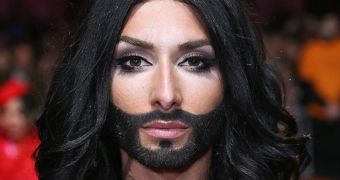The winner of the 2014 edition of Europe’s famous Eurovision singing competition was announced over the weekend: Conchita Wurst, aka the “Bearded Lady” from Austria, took home the grand prize with 290 points, becoming the first drag queen ever to win the show.
What followed next is what you probably expect: though Conchita’s participation in the competition had sparked outrage as early as September, when she became Austria’s representative, having her win it sparked even angrier responses.
Most of them came from Russia: from supporters of Putin’s anti-gay legislation specifically, Global Voices Online confirms. All of them invariably warned Ukrainians that further integration in Europe would pervert values completely, because Europe proposed as norm women with beards like Wurst.
For the record, Wurst is not a woman. Conchita is the stage name of 25-year-old drag queen Tom Neuwirth: Tom identifies as “he” in real life but, when he is up on stage as Conchita, he prefers to be a “she.”
Conchita is the first drag queen to win Eurovision, but she is not the first gender-bending artist to do so or, for that matter, draw this much ire and attract controversy. Transgender woman Dana International did that in 1998 but, at the time, says the aforementioned publication, Eurovision did not air in Russia because the country was not allowed participation on account of low scoring from the previous years.
Speaking of outrage from Russia on social media, various prominent public figures took to their Twitter and Instagram accounts to shave their beards in protest of Conchita’s win, including two rappers, who instigated their followers to violence and online bullying, urging them to bash and “assault any gay couple in Russia that dared to hold hands and kiss in public.”
“Eurovision always agitates Russia’s homophobes. The contest’s performances are invariably flamboyant and difficult to square with any traditional concept of masculinity. Thanks to the conflict in Ukraine, East-West tensions are now at a post-Soviet highpoint, and gay-bashing benefits from Russia’s surge in patriotic chauvinism,” Global Voices Online notes.
Eurovision was inaugurated in 1956 and includes as participants 37 European countries, members of the European Broadcasting Union (EBU). Every year, representatives of all countries perform live over the course of 5 days, with the winner determined by public vote.
In Conchita’s case, she was declared winner even before the final count was over, as votes from 34 of the 37 countries showed she was in the lead by a huge margin. Below is her live performance, in case you missed it.

 14 DAY TRIAL //
14 DAY TRIAL // 